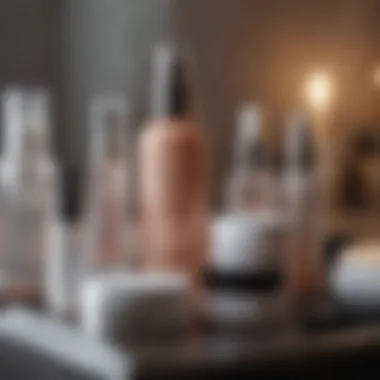Natural Approaches to Acne: A Complete Guide


Intro
Acne is a prevalent skin condition that affects millions of people worldwide. While medication may provide relief, many seek natural solutions to avoid potential side effects or dependency. This guide explores various methods for addressing acne without pharmaceuticals. By focusing on natural remedies, dietary changes, and effective skincare routines, we aim to provide readers with comprehensive strategies for achieving clear skin.
Insider Beauty Tips
Beauty Hacks
Acne management often begins with simple yet effective beauty hacks. One notable method involves using tea tree oil. This essential oil has antimicrobial properties that can help reduce inflammation. Dilute a few drops of tea tree oil in a carrier oil, like coconut oil, and apply it directly to the affected areas.
Another effective hack is the use of aloe vera gel. Aloe is known for its soothing properties, which can help calm irritated skin. Apply fresh aloe vera directly from the plant to the skin, letting it absorb for about 30 minutes before rinsing.
Skincare Tips
A proper skincare routine is crucial in managing acne. Cleanse the skin twice daily using a gentle cleanser that doesn’t strip essential oils. Look for products that contain salicylic acid or glycolic acid, which can help to exfoliate and prevent clogged pores.
Moisturizing is just as important. Even oily skin needs hydration. Opt for non-comedogenic moisturizers that won’t block pores. Look for lightweight gel moisturizers that contain hyaluronic acid, ensuring skin stays hydrated without adding excess oil.
Haircare Secrets
Oily hair can contribute to acne, especially when hair products come into contact with the skin. Use sulfate-free shampoos that cleanse without over-drying. Regularly wash your hair to remove buildup from products, and consider styles that keep hair off the face.
Dietary Considerations
The notion that diet impacts skin health is gaining traction within the scientific community. Certain foods may exacerbate acne, while others may promote clearer skin. Here are some dietary considerations:
- Increase Omega-3 Fatty Acids: Foods rich in Omega-3, like walnuts and chia seeds, may help reduce inflammation.
- Limit Dairy and High-Glycemic Foods: Some studies suggest a correlation between dairy consumption and acne. Sugary or refined carbohydrates may also trigger breakouts.
- Hydrate: Drinking plenty of water is essential for maintaining skin health.
Closure
"In the journey to clearer skin, patience and dedication are essential. Each person's skin is unique, and what works for one may not work for another."
Embarking on this journey might take time, but the rewards can lead to significantly improved skin health without the side effects associated with pharmaceutical treatments.
Understanding Acne
Acne is a complex skin condition that affects a significant portion of the population. Understanding acne is crucial for anyone looking for effective treatment options that do not rely on medication. By grasping the underlying mechanisms and different types of acne, individuals can better navigate their skincare routines and lifestyle choices. This foundational knowledge lays the groundwork for exploring holistic and natural approaches discussed further in this article.
The Biological Mechanism of Acne
The biology of acne primarily involves the sebaceous glands, which produce oil. When these glands overproduce oil, it can lead to clogged pores. Additionally, the presence of a specific bacteria known as Propionibacterium acnes plays a role in inflammation and the development of acne lesions. Hormones, particularly androgens, also increase oil production. A comprehensive understanding of these biological aspects can help inform the choices one makes in their skincare and lifestyle habits.
Types of Acne
Understanding the types of acne is integral for effective management. Each type has unique characteristics and requires different approaches.
Comedonal Acne
Comedonal acne is characterized by non-inflammatory lesions, mostly blackheads and whiteheads. This form of acne is often a visible early sign of acne development. It is beneficial to understand this type because it generally responds well to treatment. People can often manage comedonal acne through regular exfoliation and keeping the skin clean. The main unique feature of comedonal acne is that they do not cause significant inflammation, making it easier to treat with non-prescription products like salicylic acid.
Inflammatory Acne
Inflammatory acne includes pustules and papules that are often red and swollen. This type signals a higher level of irritation in the skin. Understanding inflammatory acne is crucial because it may indicate the need for more specific skin treatment options, including topical remedies. The key characteristic is the presence of inflammation, which can lead to scarring if not treated properly. Its unique feature is that it often requires a patient approach and possibly more rigorous skincare routines to control outbreaks.
Cystic Acne
Cystic acne is the most severe form and is marked by deep, painful lesions. This type can cause significant distress and emotional burden on individuals. Understanding cystic acne is essential, as it often requires intervention from a dermatologist. The unique feature here is its depth and potential for scarring, making it a challenging but crucial type to comprehend for effective treatment. Those suffering from cystic acne may benefit from specialized treatments alongside lifestyle adjustments.
Holistic Approaches to Acne Treatment
Holistic approaches to acne treatment emphasize the connection between the body and mind, integrating multiple lifestyle factors that contribute to skin health. This section discusses how diet, stress management, and various wellness practices can lead to clearer skin without relying solely on medication.
The Role of Diet in Skin Health


Diet significantly influences skin health. Consuming a balanced diet rich in vitamins, minerals, and antioxidants can promote better skin. Foods high in omega-3 fatty acids and low in refined sugars can be particularly beneficial. Omega-3s can reduce inflammation, while refined sugars often lead to spikes in insulin, triggering acne-breakouts. Eating plenty of fruits, vegetables, nuts, and whole grains creates a nutrient foundation for clear skin.
Consider incorporating these dietary strategies into your routine:
- Increase water intake: Staying hydrated helps skin maintain elasticity.
- Limit dairy and high glycemic foods: These can trigger acne in some individuals.
- Focus on probiotics: Fermented foods like yogurt support gut health, which can influence skin health positively.
Stress Management Techniques
Stress can exacerbate acne due to hormonal fluctuations and inflammation. Effective stress management techniques can therefore have a positive impact on skin clarity.
Meditation
Meditation offers a way to calm the mind and reduce stress. Regular practice is known for its ability to lower cortisol levels, which can decrease oil production in the skin. The process of meditation promotes relaxation and mindfulness, fostering a sense of inner peace. One key characteristic of meditation is its accessibility; many forms allow individuals to practice anywhere and anytime. The main advantage is that it can be tailored to fit personal schedules and preferences, making it a beneficial choice for managing stress levels.
Yoga
Yoga combines physical exercise with mental focus, providing an effective means of stress relief. The physical postures help with circulation and respiratory function, which are critical for healthy skin. One unique feature of yoga is its emphasis on breath control, linking movement with breathing in a centered manner. This practice assists in improving overall well-being. However, a potential disadvantage is that beginners may find it difficult to incorporate more complex poses, but simpler routines can also yield significant benefits.
Breathing Exercises
Breathing exercises engage the body’s relaxation response, helping to lower tension and enhance focus. These exercises are simple and can be performed at any time. A marked characteristic of breathing techniques is their focus on intentional inhalation and exhalation, which can help stabilize emotions and reduce stress. The primary advantage is their simplicity; they do not require special equipment or extensive time commitments, making them easily integrated into daily life.
Natural Remedies for Acne
Natural remedies play a pivotal role in tackling acne without the use of medication. They provide an alternative route to managing skin issues. These strategies focus on utilizing botanical extracts, essential oils, and dietary changes to promote skin health. People are increasingly turning to these methods due to concerns over side effects associated with pharmaceutical options. Additionally, natural remedies often aim to treat the root causes of acne, rather than just the symptoms. This holistic approach can result in sustainable improvements in skin condition.
Understanding the benefits of natural treatments is essential. Many of these remedies are generally safe, accessible, and can often be integrated into daily routines. They also align well with trends towards natural and organic products in skincare.
Herbal Treatments
Herbal treatments are among the most effective natural remedies for acne. They harness the power of plants and their compounds to combat bacteria, reduce inflammation, and regulate oil production.
Tea Tree Oil
Tea tree oil stands out due to its proven antibacterial properties. It is highly regarded for its ability to kill acne-causing bacteria on the skin. Additionally, its anti-inflammatory effects can reduce redness and swelling associated with acne. This oil has a unique ability to penetrate the skin’s outer layer, making it effective for treating deep-rooted pimples. While tea tree oil is widely considered beneficial, some individuals may experience skin irritation or allergic reactions. It’s important to conduct a patch test before full application.
Green Tea Extract
Green tea extract is celebrated for its antioxidant content. It helps to neutralize free radicals that can contribute to skin damage and inflammation. This extract can also regulate the production of sebum, which is crucial in preventing clogged pores. The key characteristic of green tea extract is its polyphenols, which are known to combat the growth of bacteria. However, applying concentrated forms might cause sensitivity in some skin types. Thus, starting with diluted versions can mitigate possible issues.
Essential Oils and Their Benefits
Essential oils have gained traction for their aromatic qualities and therapeutic effects. They can contribute significantly to acne treatment, thanks to their anti-inflammatory and antibacterial properties.
Lavender Oil
Lavender oil is valued for its calming properties, which extend beyond aromatherapy. It possesses anti-inflammatory and antimicrobial characteristics that can help soothe acne-prone skin. Lavender oil is especially beneficial for those whose acne is exacerbated by stress. Its unique feature lies in promoting skin regeneration while calming irritated areas. Nevertheless, like other essential oils, it should be used with caution, especially in concentrated forms.
Rosemary Oil
Rosemary oil offers numerous benefits as well. Rich in antioxidants, it promotes improved circulation and provides anti-inflammatory effects. This oil is also recognized for its ability to reduce excess oil production, which is crucial for preventing acne breakouts. The unique characteristic of rosemary oil is its stimulating effect on the scalp and hair follicles as well. Some may find it slightly irritating, so performing a patch test can pin down any sensitivities.
Incorporating natural remedies into your skincare routine requires patience and consistency. While they can be effective, individual results may vary.
Natural remedies present diverse options for those seeking to treat acne holistically. They allow individuals to customize their approach based on personal preferences and skin types. Engage with these treatments judiciously, and consider consulting with professionals if needed.
Skin Care Practices
Skin care practices play a crucial role in managing and reducing acne without medication. An effective skin care routine can help maintain a balance within the skin, preventing breakouts while promoting healing of existing blemishes. Understand that the skin is a dynamic organ, continuously adjusting to external and internal factors. Developing a consistent routine tailored to your specific skin type can have long-standing benefits, not only for acne but also overall skin health.
Daily Cleansing Routines
Cleansing is the first step in any skin care regimen. It removes dirt, oil, and impurities that can contribute to acne. Using a gentle cleanser suitable for your skin type helps maintain the skin’s natural barrier. It is important to avoid harsh soaps or scrubs that can irritate the skin, causing more harm than good.
Aim to cleanse your face twice a day—once in the morning and once before bedtime. This routine helps prevent excess oil production and allows proper skin respiration.


When selecting a cleanser, consider using one with salicylic acid or benzoyl peroxide, which can aid in treating acne. However, these ingredients can also be drying, so it's wise to follow with a moisturizer.
Moisturizers and Their Importance
Often, acne sufferers think that moisturizing will worsen their condition. However, keeping the skin hydrated is essential. Using a non-comedogenic moisturizer ensures that the pores aren’t clogged. Moisturizers help to maintain skin elasticity and provide the necessary nourishment.
Look for lightweight, oil-free options if you have oily skin. For individuals with dry or combination skin, richer formulations may be more effective. Moisturizing is not just a step; it is a protective layer and a hydration source for the skin.
The Role of Exfoliation
Exfoliation is the process of removing dead skin cells, which can clog pores and lead to acne. There are two main types of exfoliants: chemical and physical. Each type has its distinct advantages.
Chemical Exfoliants
Chemical exfoliants use acids, such as alpha-hydroxy acids and beta-hydroxy acids, to dissolve dead skin cells. This process can lead to smoother skin texture and helps prevent clogged pores, which are a common cause of acne.
The key characteristic of chemical exfoliants is their effectiveness at a microscopic level. They can penetrate deeper into the skin compared to physical exfoliants. A unique feature of these exfoliants is that they tend to provide more uniform results. However, it is vital to start with a lower concentration to gauge how your skin reacts. Overuse can lead to irritation and sensitivity.
Physical Exfoliants
On the other hand, physical exfoliants work by physically scrubbing the skin. These can include scrubs that contain small granules or even natural ingredients like oatmeal. The key characteristic of physical exfoliants is their immediate, tactile effect.
They are often favored for their simplicity and ease of use. A unique feature of physical exfoliants is their instant feedback; you feel the cleansing action. However, they can sometimes cause microtears in the skin if not used gently. It is crucial to exfoliate no more than two or three times a week to avoid over-exfoliation, which can worsen acne.
Exfoliation should be approached with caution, as both methods can irritate the skin if used excessively.
By understanding and implementing these skin care practices, individuals can develop a robust routine that contributes to healthier skin and potential reduction in acne occurrences.
Lifestyle Adjustments
Importance of Lifestyle Adjustments in Acne Treatment
Lifestyle adjustments play a significant role in managing acne without medication. This approach is holistic and encompasses various aspects of daily life. Optimizing your lifestyle not only improves skin health but overall well-being too. Specific adjustments can enhance your skin's natural resilience against acne outbreaks, decreasing the reliance on pharmaceutical interventions.
Adequate Sleep and Its Effects on Skin
Sleep is fundamental for numerous bodily functions, with a direct impact on skin health. When you do not get enough quality sleep, the body cannot effectively repair itself. Lack of sleep can lead to increased stress hormones, such as cortisol, which may exacerbate acne.
To optimize your sleep:
- Aim for 7-9 hours each night.
- Create a consistent sleep schedule, going to bed and waking up at the same time.
- Design a calming bedtime routine, reducing screen time and bright lights before sleep.
Good sleep hygiene fosters skin recovery. By implementing these habits, you might notice improvement in your overall skin appearance, texture, and health.
Hydration and Its Importance
Hydration is crucial for various bodily functions. Drinking an appropriate amount of water daily can aid in maintaining skin elasticity and moisture. Dehydrated skin can lead to increased oil production, which may worsen acne.
To support proper hydration:
- Aim for 8-10 glasses of water a day.
- Consume hydrating foods, like cucumbers and watermelon.
- Limit dehydrating beverages, such as those high in caffeine or alcohol.
Adequate hydration encourages skin clarity and facilitates the natural detoxification process.
Physical Activity and Skin Health
Regular physical activity can enhance skin health in multiple ways. Exercise boosts circulation, promoting better nutrient delivery to skin cells. Additionally, it helps to reduce stress and may balance hormone levels, both significant factors in acne development.
To maximize the benefits of physical activity:
- Engage in at least 30 minutes of moderate exercise most days.
- Choose activities you enjoy, such as running, cycling, or yoga.
- Consistency is crucial; find a routine that fits your lifestyle.
Notably, it is essential to cleanse your skin post-exercise to remove sweat and bacteria that could lead to clogged pores. Therefore, ensure your skincare routine aligns with your active lifestyle.
Understanding Triggers
Understanding the various triggers that lead to acne breakouts is crucial for anyone looking to manage this skin condition effectively. By identifying these factors, individuals can make informed choices about their lifestyle and skincare routines. Ignoring the triggers can hinder the effectiveness of other methods used to control acne. Therefore, it is vital to explore how factors like hormones, diet, and the environment can contribute to acne development.
Hormonal Factors
Hormonal fluctuations are a significant aspect of acne that many people encounter, especially during puberty, menstrual cycles, and periods of high stress. Androgens such as testosterone can increase sebum production in the skin’s sebaceous glands. This higher oil production can clog pores, leading to inflammation and breakouts. Tracking hormonal changes can help in understanding personal skin patterns, enabling one to take preventative measures during critical times.


Dietary Triggers
Diet plays a pivotal role in skin health. Certain foods have been linked to increased acne, while others may help reduce inflammation and improve skin clarity.
Dairy Products
Dairy products, particularly milk, have been linked to acne due to their hormone content. These products may influence insulin levels and stimulate sebum production. While some people find dairy causes a noticeable increase in acne, others may consume it without issues. It’s important for individuals to monitor their skin's response to dairy and adjust their intake accordingly.
High Glycemic Foods
High glycemic foods, like white bread and sugary snacks, can spike insulin levels rapidly. This spike can also trigger increased oil production in the skin. For those looking to manage acne, opting for low glycemic alternatives might be a better choice. Whole grains, legumes, and most fruits provide more stable blood sugar levels and could minimize acne outbreaks.
Environmental Factors
Environmental factors, including pollution and humidity, also significantly contribute to acne. These external elements can irritate the skin and lead to increased oiliness or blockage of pores.
Pollution
Pollution exposes the skin to harmful particles that can clog pores and create an environment conducive to breakouts. It can also lead to oxidative stress, which may worsen existing skin conditions. Regular cleansing, especially in polluted urban areas, is essential for maintaining skin health.
Humidity
High humidity levels can lead to excess sweat and oil production. When skin is overly moist, it can create the perfect breeding ground for bacteria, resulting in an increased likelihood of breakouts. Adjusting skincare routines according to the weather and using non-comedogenic products is advisable for those living in humid climates.
"Understanding triggers is a key step in creating a personalized plan for smoother skin."
In summary, recognizing the various types of triggers such as hormonal changes, dietary habits, and environmental influences can provide valuable insights into managing acne effectively. By altering lifestyle choices and being aware of individual triggers, one can better control their skin health.
Monitoring Progress
Monitoring progress is a critical aspect of managing acne without medication. By keeping a close eye on various factors that influence your skin, you can make informed decisions about your skincare routine and lifestyle choices. Tracking progress allows you to identify effective remedies and adjust your approach as necessary. This personalized attention to your skin's needs can lead to better outcomes and greater understanding of the condition.
Importance of Tracking
Tracking your skin's condition offers several benefits. First, it helps you notice patterns related to your acne flare-ups. For instance, you might recognize that certain foods trigger breakouts or that lack of sleep worsens your skin's appearance. With this awareness, you can adjust your diet and establish healthier sleep habits.
Additionally, maintaining a diary, which could include photographs, descriptions, or even a simple checklist of daily habits, can provide visual feedback. This process can be motivating, showing tangible results over time. Even small improvements can boost your confidence and commitment to continuing your regimen.
Moreover, tracking allows for real-time evaluation. If you notice any adverse reactions to a new product or remedy, you can stop using it immediately. This immediate feedback loop can help prevent further irritation and aid in selecting products that suit your skin type.
What to Look for in Improvement
When monitoring your progress, it’s essential to know what to look for. Consider the following aspects:
- Frequency of Breakouts: Noticing a decrease in how often you experience pimples or cystic acne is a significant indicator of progress.
- Severity of Acne: Pay attention to the size and redness of existing breakouts. Less inflammation and smaller lesions are positive signs.
- Skin Texture: Smoother skin with a reduction in bumps can indicate improvements in your overall skin health.
- Visible Scarring: Any reduction in hyperpigmentation or scarring can demonstrate that your skin is healing.
Regular monitoring encourages proactive management and adaptation of your skincare routine to oscillate according to the unique needs of your skin over time.
In summary, effective monitoring provides a structure to your acme management endeavors. By recognizing what is working and what is not, you can adjust your strategies accordingly, leading to healthier skin in the long run.
When to Seek Professional Help
Understanding when to consult a dermatologist is crucial for anyone dealing with acne. While many cases can be managed through natural remedies and lifestyle changes, there are instances when professional intervention becomes necessary. By identifying key indicators of severe acne and discussing potential options with a dermatologist, individuals can better navigate their path to clearer skin.
Indicators of Severe Acne
Severe acne represents a more intense form of the condition, signifying that it may require professional guidance. Some indicators that suggest a consultation is necessary include:
- Persistent Breakouts: If acne continues unabated for weeks or months despite trying home remedies, it indicates a need for expert advice.
- Inflammation: Severe redness, swelling, and inflammation can signal the presence of cystic acne, which often requires medical treatment.
- Scarring: The development of post-inflammatory hyperpigmentation or scarring can indicate that the acne is severe enough to warrant professional care.
- Painful Nodules: If you experience painful nodules under the skin, it suggests deeper factors that need medical attention.
Recognizing these signs and acting promptly can help prevent further skin damage and emotional distress.
Discussion of Options with Dermatologist
An important conversation with a dermatologist can empower individuals with knowledge about the most effective treatments available. When discussing options, consider these factors:
- Treatment Plans: Doctors may suggest topical or systemic treatments tailored to individual skin types and severity of acne.
- Procedures: In some cases, dermatologists may recommend procedures such as chemical peels or drainage for cystic acne, which can provide immediate relief and accelerate healing.
- Medication Alternatives: Dermatologists can also help evaluate non-pharmaceutical options, including prescription-strength topical treatments derived from natural ingredients.
Consultation is not only about finding a solution but also about understanding the underlying causes of acne. Specialists can provide a comprehensive view based on medical history and specific skin concerns.
Seeking professional help can greatly enhance your ability to combat severe acne effectively. It is better to address concerns early than to wait for the situation to worsen.







